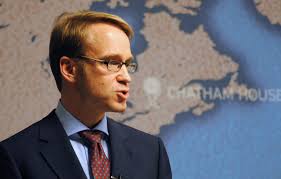Introduction
Dear Chancellor Bierlein,
dear Vice-Chancellor Jabloner,
dear Finance Minister Müller,
dear President Mahrer,
dear Governor Holzmann,
dear Ewald,
ladies and gentlemen,
Joseph Schumpeter once said that to realise the relative validity of one’s convictions and yet stand for them unflinchingly is what distinguishes a civilised man from a barbarian.1 Ewald Nowotny is an exceedingly civilised man.
As an economist, he is aware that many insights are preliminary and potentially mistaken. At the same time, Ewald Nowotny is, in his charming way, always an independent and ingenious thinker. And as such, he has, for many years, left his mark on the Governing Council of the ECB. After all, of the remaining Governing Council members, only Yves Mersch and Mario Draghi can lay claim to a longer membership.
From the outset, the years on the Governing Council demanded his full commitment. Exactly two weeks after he took up office as governor of the OeNB, the insolvency of investment bank Lehman Brothers left the financial community in a state of shock. The resolute monetary policy response helped to prevent a worse outcome.

Similarly, the subsequent sharp economic downturn in the euro area forced the Governing Council of the ECB to take unusual decisions. This period was incomparably challenging for central bankers – and instructive for us all.
Ewald Nowotny has always unhesitatingly shared his wealth of experience with me and others. He has always been there to advise me and other colleagues if we had any questions. For that, I would like to thank you once again most sincerely, dear Ewald.
In all these years, the Governing Council has been able to count on your competence and independent judgement. But why is an independent assessment so valuable, especially in bodies such as the ECB’s Governing Council?
2 The Jury theorem
Back in the 18th century, the Marquis de Condorcet, a French mathematician and philosopher, examined the question of what conditions had to be met for a jury to be more likely than a single voter to arrive at the correct judgement when voting on two alternatives.2
In his important contribution to probability theory, Condorcet showed that if each individual member has sufficient good judgement and decides completely independently, the group is more likely to select the superior alternative.
The British mathematician Francis Galton was also surprised by the potential precision of a “vox populi”, a voice of the people.3 When he visited a livestock exhibition in 1906, competitors in a quiz estimated the weight of one of the show’s oxen. It transpired that the competitors’ average estimate corresponded to the ox’s actual weight of 1,197 pounds.
Condorcet’s conditions – sufficient expertise and independent judgement – are often far from being fulfilled. In real decision-making situations, the information upon which members of a group base their decisions is frequently the same, or at least similar. This alone means that their voices are not independent of one another.
Where they are dependent, aggregation in itself no longer guarantees that the jury will tend to select the better outcome. This is because its members may jointly succumb to the same error.
As a consequence, a wide range of ideas, experiences and views is essential if the judgement of a group is to be, on balance, superior to that of an individual. Probability theory has meanwhile shown that a jury is more likely to take a sound decision, even under more realistic assumptions, if its members’ outlooks are sufficiently different.4
What the Governing Council therefore needs is experience and independence of judgement, and that is something Ewald Nowotny has always supplied in abundance.
3 Monetary policy
It is especially important to look at data, concepts and potential viewpoints as holistically as possible where uncertainty about future developments is particularly high.
Looking at the global and the euro area economy, it is abundantly clear that we are in such a period of uncertainty. The Governing Council of the ECB passed a very comprehensive package of measures when it met in mid-September, which, looked at in its entirety, I believe to be overdone.
The economic situation and the outlook in the euro area are not so bad, wages are rising clearly, the forecast for the inflation rate two years ahead was lowered only slightly and there is no evident danger of deflation, in other words a permanent drop in prices and wages.
ECB President Mario Draghi has pointed out the divided opinions on the current package of measures within the Governing Council. I consider it not just normal, but absolutely imperative, for far-reaching measures such as government bond purchases to spark intense debate.
The Austrian philosopher Karl Popper once stated that only critical discourse could give us the maturity to consider an idea from more and more angles and to evaluate it properly.5
And to my mind, the conditions under which the Eurosystem has been buying government bonds since 2015, for example, illustrate how this kind of debate can in fact improve our decisions. During our discussions back then, we drew boundaries in the purchase programme to mitigate the risk of monetary policy being harnessed to fiscal policy.
With that in mind, I hope that the decisions that have now been made do not call into question these restrictions, for example with regard to upper limits relative to a government’s total debt or relative to the volume of a single issue, or the principle that purchases are distributed across Member States’ bonds according to the ECB’s capital key and not according to the amount of government debt. After all, nothing has changed when it comes to the validity and importance of the limits on government bond purchases decided by the Governing Council of the ECB.
Particularly in a monetary union where Member States enjoy fiscal autonomy, it is vital to ensure that the line between monetary and fiscal policy does not become blurred.
The central banks’ response to the crisis also posed temptations with regard to the Eurosystem, which it should not pursue. To quote Ewald Nowotny: “A lot is being asked of the ECB [-]. Some of it we can’t deliver – because our framework is different to that of the US Fed.”6
This is of course all the more true of demands such as those espoused by Modern Monetary Theory: transferring the objective of price stability to fiscal policy and making monetary policy, in the role of an agent, subordinate to fiscal policy would be doing a disservice to society.
Even though economists in fact disagree about many issues, the notion that independent central banks focused on price stability are good for a society’s prosperity is backed up by theory and empirical evidence and enjoys broad consensus.
This is also illustrated by the OeNB’s long history. At its anniversary three years ago, Ewald Nowotny stated: “Yet, irrespective of the challenges the Nationalbank faced at different moments of its 200-year history, the overarching principles of its policy were always the same: the quest for stability, built on trust in the Nationalbank, which in turn is fundamentally linked to its independence.”7
It is also the shared quest for price stability that unites the members of the ECB Governing Council. I was sorry to note the resignation of Sabine Lautenschläger last week. Her voice was also an asset to the Council and will be missed. The diversity of opinions and perspectives on the Council was always a strength, not a weakness. “United in diversity” is more than just the motto of the European Union, which may seem abstract to many. It is also a firm mandate to approach one another and bring people together.
4 Conclusion
Ladies and gentlemen, the links between the Oesterreichische Nationalbank and the Bundesbank are many and varied. In the spirit of friendliness, we hold regular joint meetings of our management bodies and discuss important matters relating to work in the Eurosystem.
And last year, for example, OeNB and Bundesbank experts joined together to study whether blockchain technology can aid in the exchange and distribution of information between clearing houses in real time. The extensive IT expertise of our Austrian colleagues was especially valuable to the project.
I’d like to thank you, Ewald, for the trust given to us in this collaboration, but also your fellow Governing Board members Andreas Ittner, Kurt Pribil and Peter Mooslechner.
And I’m quite certain that Professor Holzmann, too, will continue in the same manner. I wish him and his colleagues on the Governing Board – Gottfried Haber, Eduard Schock and Thomas Steiner – every success and look forward to future encounters and dialogue within the ECB Governing Council and beyond.
Ewald, you have embodied an independent monetary policymaker focused on stability. Your experience and clear focus will be a loss to the Governing Council.
Even if it’s no longer at official meetings, I look forward to hearing your voice in the future as well. Not long ago, you yourself quoted Jean-Claude Trichet’s words about central bankers: “You remain a member of the club.” We all look forward to it.












